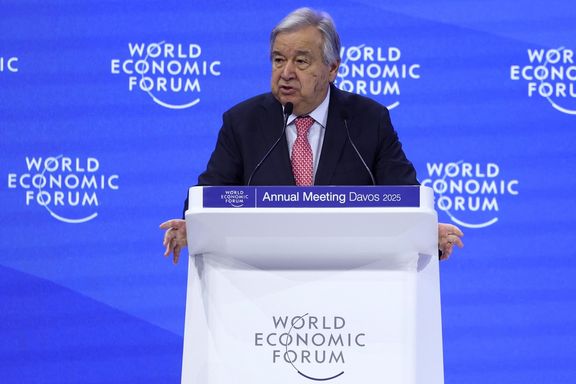UN chief urges Iran to renounce nuclear weapons

Iran must mend ties with its neighbors and the US by showing a clear commitment to abandoning nuclear weapons development, the UN chief said Wednesday.

Iran must mend ties with its neighbors and the US by showing a clear commitment to abandoning nuclear weapons development, the UN chief said Wednesday.
"The most relevant question is Iran and relations between Iran, Israel and the United States," Antonio Guterres said at the World Economic Forum in Davos, referring to Iran's two archenemies with which Iran has no diplomatic ties.
"Here my hope is that the Iranians understand that it is important to once and for all make it clear that they will renounce to have nuclear weapons, at the same time that they engage constructively with the other countries of the region."
His comments come as a top Iranian official said Monday that Tehran's nuclear program remains central to strengthening national security and deterring international threats.
“Over the years, adversaries have tried to weaken Iran’s progress in this field and entangle the country in international conflicts,” said Behrouz Kamalvandi, Iran's spokesman for the Atomic Energy Organization of Iran (AEOI), during a military conference in Tehran on Monday.
Iranian hardliners have previously advocated for developing nuclear weapons as a deterrent. After Israeli airstrikes on October 26, Javan, a newspaper linked to the Islamic Revolutionary Guard Corps (IRGC), called on Tehran to consider pursuing nuclear arms to counter external threats.
In October of the previous year, in the wake of the Gaza war sparked by Iran-backed Hamas, 39 Iranian lawmakers urged the Supreme National Security Council to reassess the nation's defense strategy and explore the potential adoption of nuclear weapons.
Meanwhile, newly sworn-in US Secretary of State Marco Rubio informed Congress that President Donald Trump intends to pursue the reinstatement of United Nations sanctions on Iran, which were lifted under the 2015 nuclear deal.
Tehran has voiced concerns that the Trump administration could embolden Israeli Prime Minister Benjamin Netanyahu to contemplate strikes on Iran’s nuclear facilities, exacerbating the already volatile security situation in the region.